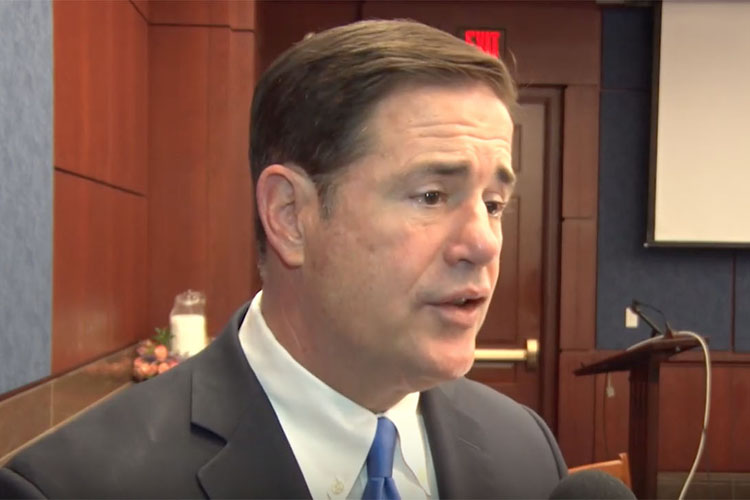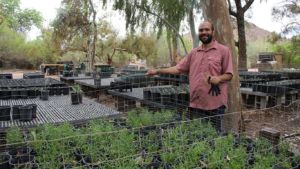Governor Doug Ducey today released his fiscally responsible, balanced budget for Fiscal Year (FY) 2021. The budget continues to make targeted, sustainable investments in the things that matter such as teacher pay raises, school safety, roads and bridges, rural jobs and technology and public safety, while returning dollars to taxpayers and saving more for the future.
This year’s budget keeps ongoing spending below the amount of revenue coming in, marking the longest streak of consecutive structural surpluses in Arizona since 2000. The budget ends the fiscal year with a structural balance of $250 million.
“With a booming economy, hundreds of new residents every day, and our highest credit rating ever, Arizona’s finances have never been better,” said Governor Ducey. “But we’re not going on a spending spree. Instead, this budget maintains fiscal discipline, saves more for a rainy day and ensures the important investments we’re making in public schools, students and beyond are sustainable. And it provides tax relief to our veterans, allowing them to keep more of their hard-earned benefits. That’s the Arizona Way. This is our most robust agenda to date, and I look forward to working with legislative leaders on a budget agreement that funds these important priorities.”
To view the budget, click HERE.
Highlights of the Executive Budget include:
K-12 EDUCATION
• $608 million total new spending for K-12 public education
• $175 million to provide additional 5% teacher pay raises, fulfilling 20×2020 plan
• $145 million in funding for enrollment growth, inflation, and other technical adjustments
• $136 million to accelerate the restoration of flexible dollars, known as Additional Assistance, two years ahead of schedule
• $108 million in Building Renewal Grants (BRG) — a 35 percent increase over last year’s level, with $35 million in supplemental BRG funding for FY2020
• $59 million for the construction of two new schools as well as seven schools currently under construction
• $44 million for a three-year pilot program, Project Rocket, designed to close the achievement gap for low-income schools
• $38 million to fund additional cops on campus, school counselors, and social workers
• $35 million to expand Results-Based Funding to help high-performing schools expand successful programs to more students
• $6 million to enhance the current square footage calculations for new school construction
HIGHER EDUCATION
• $35 million to support Arizona’s workforce and increase competitiveness through a “New Economy” initiative
$35 million in one-time operational funding for ASU, UofA and NAU
$11 million to fully restore cuts to STEM & Workforce Programs in Maricopa, Pima and Pinal community college districts
$10 million for Governor’s research and grants matching funding as part of the “New Economy” Initiative
$6 million to the 10 rural community college districts for flexible operating funding to meet the demand for career and technical education programs
• $4 million to expand the Arizona Advanced Technology Corridor
• $1 million to attract more students to the Arizona Teachers Academy
DEPARTMENT OF CORRECTIONS, REHABILITATION AND REENTRY
• $75 million in building renewal and capital management
• $48 million of that appropriation is dedicated to complete critical infrastructure improvements to locks, fire alarms and HVAC units at the Lewis and Yuma prisons
• $43 million to provide correctional officers 5 percent pay raises and create mid-level correctional corporal positions. These pay raises come in addition to last year’s 10 percent raises for a total of 15 percent since FY 2019.
• $33 million to close Florence Prison. The closure will save taxpayers $274 million over three years through the avoidance of much-need maintenance and capital upgrades.
• $9 million to expand Second Chance initiatives and educational programs and add additional substance abuse counselors
v$250,000 to expand the successful braille transcription job training program
PUBLIC SAFETY
• $7 million for wrong-way driving prevention and response, including $2 million to fund six new State Troopers dedicated to the Wrong-Way Driver Night Watch shift
• $8 million in increased grant funding to local law enforcement for additional DUI enforcement
• $2 million at the Department of Liquor Licenses and Control to create a nine-member DUI preventative and investigative task force
• $1 million at the Department of Transportation to expand the Wrong Way Driver Detection System and add 76 new thermal cameras on I-17, I-40 and I-19
• $5 million to deploy 1,267 body cameras for State Troopers
• $16 million to expand DPS radio infrastructure in Northern Arizona and modernize existing technology in Southern Arizona
• $20 million to replace DPS patrol vehicles on a regular schedule
• $15 million to replace two DPS helicopters beyond their useful life as well as ongoing funding to replace helicopters at regular intervals according to safety standards
• $12 million to enhance cybersecurity preparedness and incident response
RAINY DAY FUND
$25 million into the Rainy Day Fund to further improve Arizona’s fiscal resilience
INFRASTRUCTURE
• $59 million to lay conduit and fiber optic cable as well as install smart highway technologies in the following locations:
Interstate 17 between Sunset Point and Flagstaff
Interstate 40 between the Arizona-New Mexico and Arizona-California borders
Interstate 19 between Tucson and Nogales
• $28 million to accelerate expansion of the I-10 between Tucson and Phoenix. The investment fully funds a new six-lane bridge on I-10 across the Gila River
• $10 million to triple funding for Rural Broadband Grants
ECONOMY
• $8 million to develop a Business One-Stop portal that will provide a single online location to help citizens and businesses plan, start, grow, and relocate businesses in Arizona
• $1 million to strengthen and grow Arizona’s economy through travel and tourism promotion
VETERANS
• $45 million to fully exempt military pension pay from income tax, saving the average Arizona veteran $840 annually
• $416,400 to fund six additional Veterans’ Benefits Counselor positions, mainly in rural communities
HEALTH AND WELFARE
• $14 million to provide incentives for parents to adopt sibling groups and children with significant developmental disabilities
• $11 million for 10 percent pay raises for Department of Child Safety caseworkers
• $6 million in ongoing funding from the Medical Marijuana Fund to provide critical access to opioid treatment services to uninsured and underinsured Arizonans
• $5 million to double the “Grandmother” stipend for family members who serve as caregivers for children in out-of-home-care, otherwise known as “kinship care”
$1 million to improve health of newborns by adding two more tests to newborn testing
$400,000 to establish a Suicide Mortality Review Team to reduce suicide rates and target high-risk populations
NATURAL RESOURCES
$15 million to fully fund the Water Quality Assurance Revolving Fund Program, a program that remediates hazardous waste sites. This year’s budget marks the first time this program has received full funding since 2007.
• 5 percent raises for Department of Forestry and Fire Management firefighter salary increases
• $1.5 million for increased fire suppression funding
• $700,000 for travel reduction public awareness campaign




